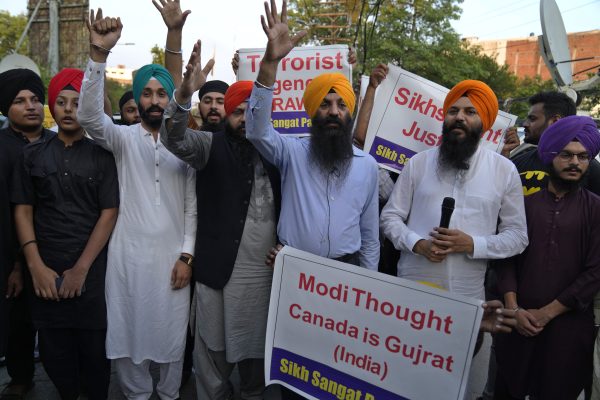The Pulse | Diplomacy | South Asia
In the past, Pakistan has accused India of eliminating people who threatened its control over Kashmir, but was rarely taken seriously by the international community.

Members of Sikh community hold a protest against the killing of Hardeep Singh Nijjar, in Lahore, Pakistan, Wednesday, Sept. 20, 2023.
Credit: AP Photo/K.M. Chaudary
The Canadian government’s recent claims of the alleged involvement of Indian agents in the killing of Sikh leader Hardeep Singh Nijjar have sparked international attention and raised concerns. Nijjar, who was wanted by India for alleged militant activities, was killed earlier this year in British Columbia (BC), Canada.
Pakistan has wasted no time in involving itself in the dispute between India and Canada over the killing. In response to Canada’s allegations, Pakistan has crafted its own narrative by linking the episode to Prime Minister Narendra Modi’s ideology of Hindu nationalism and similar actions in Pakistan. “These ideologues of Hindutva, they are becoming emboldened in a manner that they are now going beyond the region,” Pakistan’s interim Prime Minister Anwaar-ul-Haq Kakar said at the Council on Foreign Relations in New York recently.
Taking it a step further, Pakistan has gone as far as saying that India’s “network of extra-territorial killings has now gone global.” Pakistan’s Foreign Secretary Cyrus Qazi has asked the international community to wake up to the ways of a country that is “a supposedly indispensable ally.”
Islamabad asserts that it is not surprised by Canada’s criticism of the Indian government over the killing of the Sikh activist since it is consistent with how Pakistan sees India acting elsewhere.
Diplomat Brief
Weekly Newsletter
Get briefed on the story of the week, and developing stories to watch across the Asia-Pacific.
Get the Newsletter
Mumtaz Zehra Baloch, a spokesperson for the Pakistani Foreign Ministry, told reporters last week that Pakistan has continued to be the victim of a number of “targeted killings and espionage” operations by the Indian intelligence services.
Pakistan has in the past accused India of conspiring to kill individuals who it believes pose a threat to New Delhi’s strategy on the integration of Jammu and Kashmir. A dossier detailing India’s involvement in an attack in the northeastern city of Lahore in June 2021 was made public by Pakistan last year. According to reports, the attack, which Islamabad accuses the Indian intelligence service of carrying out, was intended to kill Hafiz Muhammad Saeed, the detained leader of the proscribed Jama’at-ud-Dawah.
In a most recent murder, which happened earlier this month, the former leader of the JuD, who maintained a link with the armed resistance in Kashmir was shot and killed in Pakistan-administered Kashmir.
Part of Pakistan’s hyperreaction stems from the fact that similar targeted killings allegedly committed by India within Pakistan have not gotten enough international attention. Pakistan now sees an opportunity to present its case to the international community in light of the Canada killing. Pakistan’s efforts to draw attention to the killing of the Sikh leader in Canada are aimed at convincing the international community that Nijjar’s killing is not an isolated event, but rather part of a pattern of behavior by India.
Advertisement
It is uncertain, though, whether Pakistan’s tirade against India in the wake of the murder in Canada will provide it with diplomatic advantage. Even if India was responsible for the assassination, according to Dr. Zainab Ahmed, head of the Department of International Relations at the Lahore Garrison University, the countries involved in the conflict are considerably outside of Pakistan’s diplomatic reach and scope. “The US and Western countries are probably looking for a way to pacify both Canada and India so that things can be settled quietly,” Ahmed told The Diplomat.
Ahmed went on to point out that Pakistan’s foreign policy does not carry enough weight with world leaders to get their attention regarding Pakistan’s claims against India. “It’s time for Pakistan to reflect,” she said, adding that in order to convince the world to take Pakistan’s legitimate claims seriously, “it must put its house in order.”
In any case, for Pakistan, India has become emboldened enough to carry out assassinations on a global scale. One Pakistani security official, who spoke with The Diplomat described the Canada killing as “India’s Jamal Khashoggi moment.” The official stated that “the world is now directly witnessing the true face of India, as Pakistan has always known it.”
The official warned that attempts by India to assassinate people in Pakistan may intensify as the country gets closer to general elections.
Pakistan officials are concerned that India may try something dangerous in Pakistan as well. “Any such possibility could have terrible implications for regional stability and conflict with India,” he warned.

